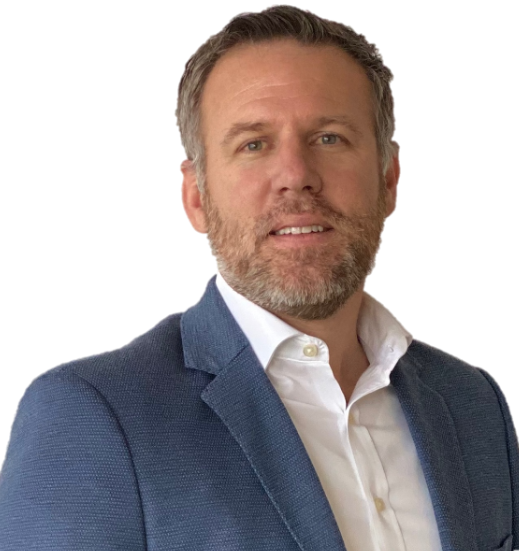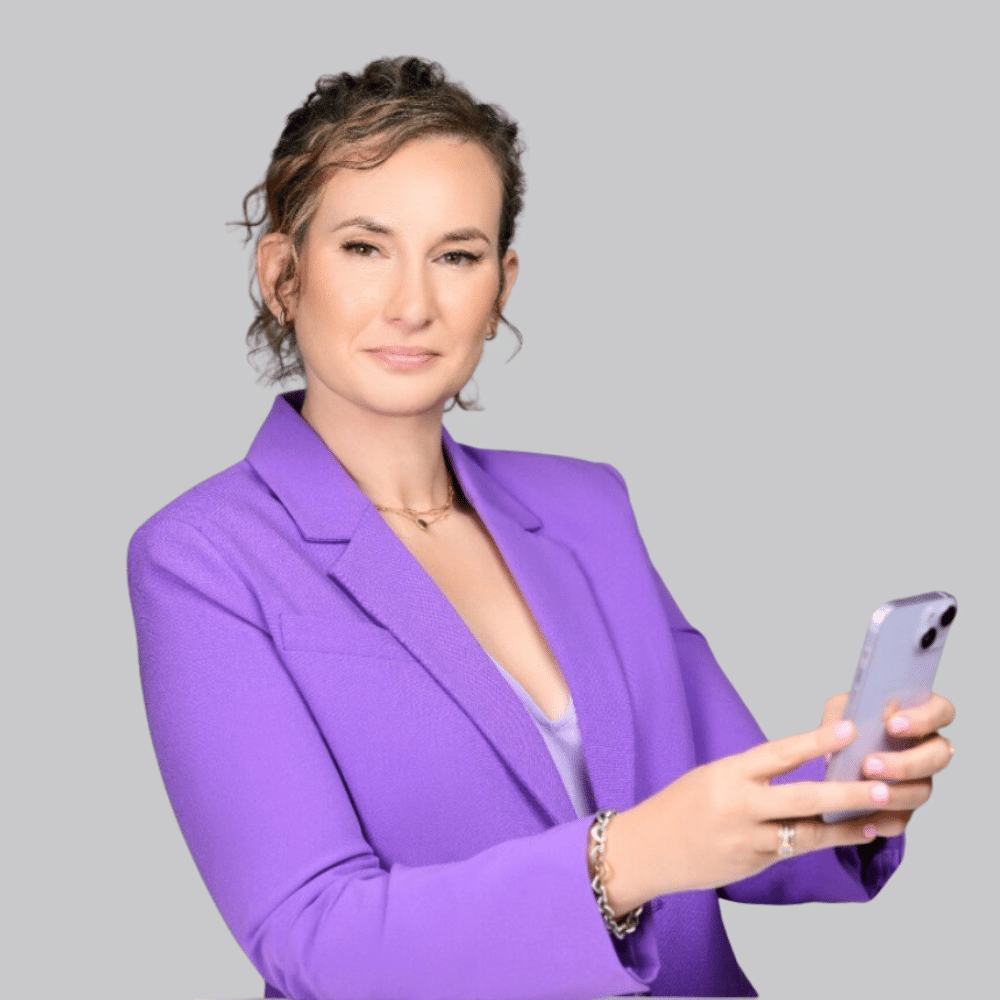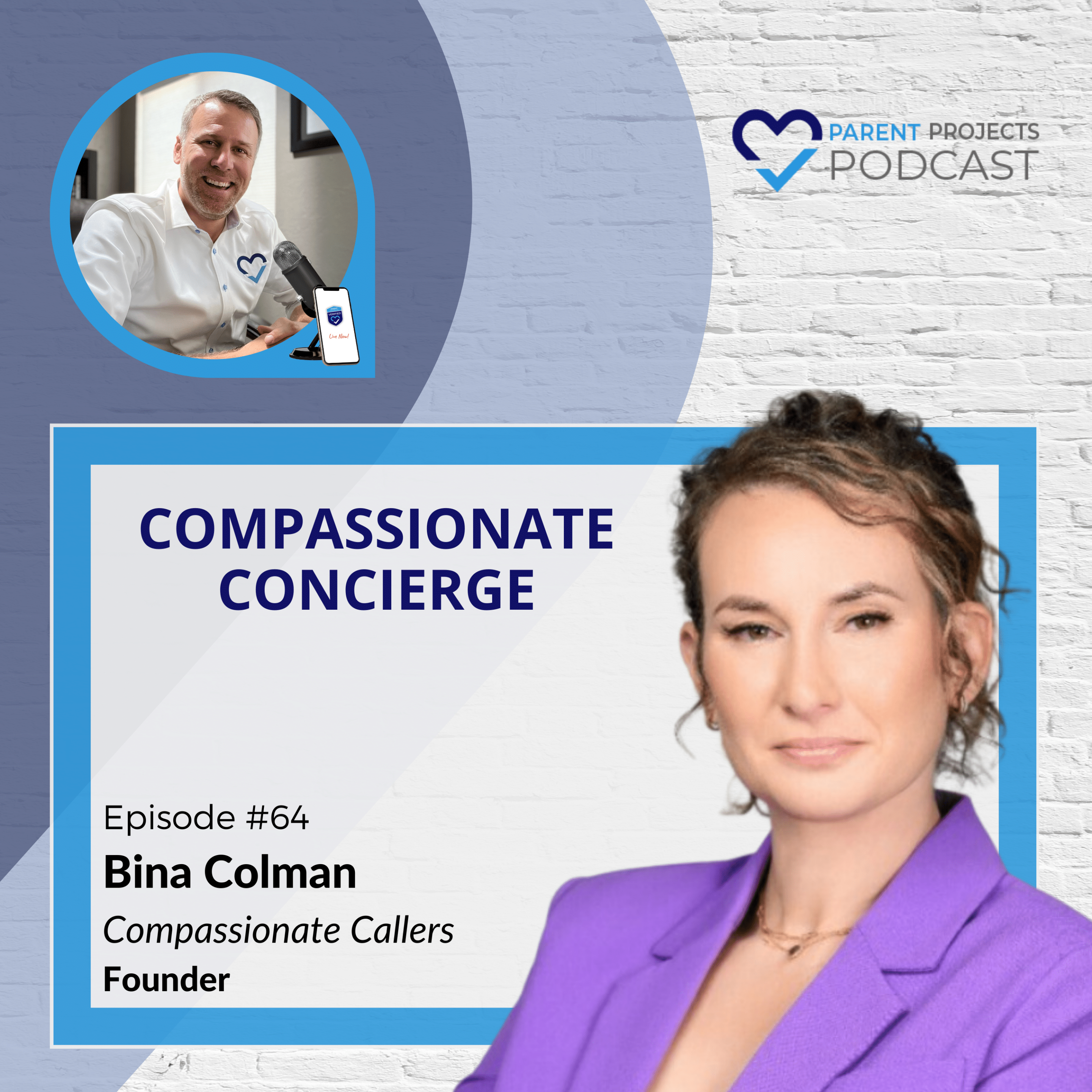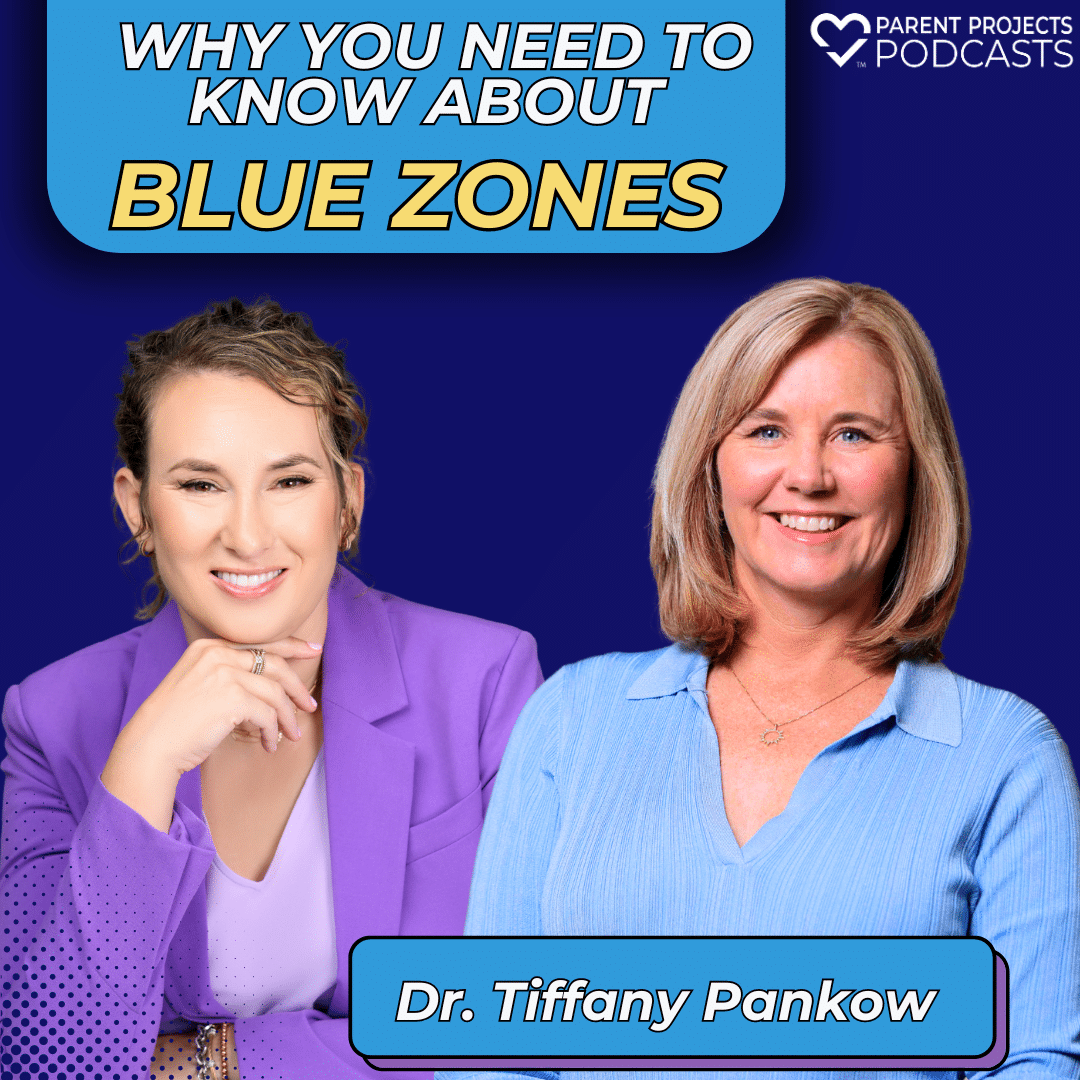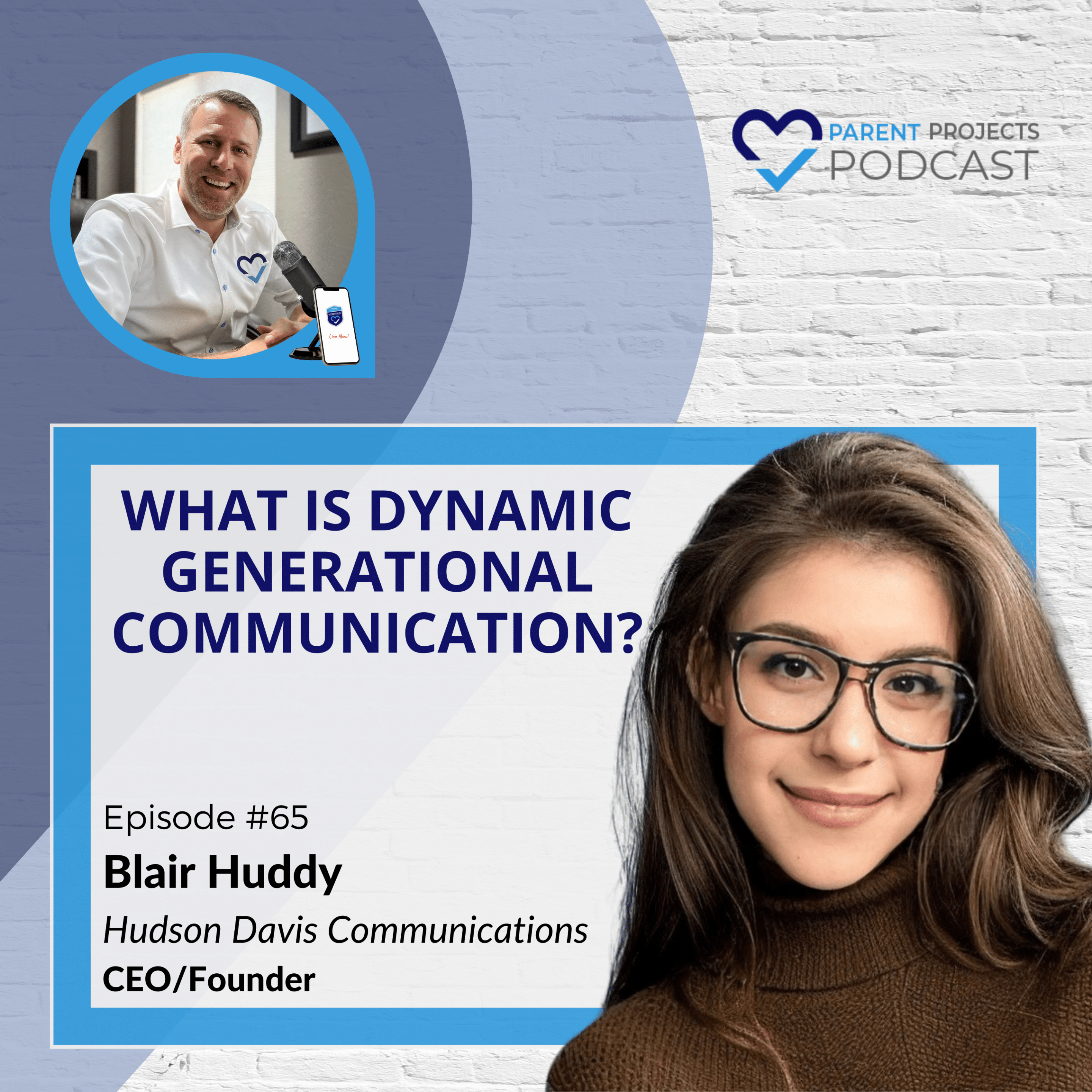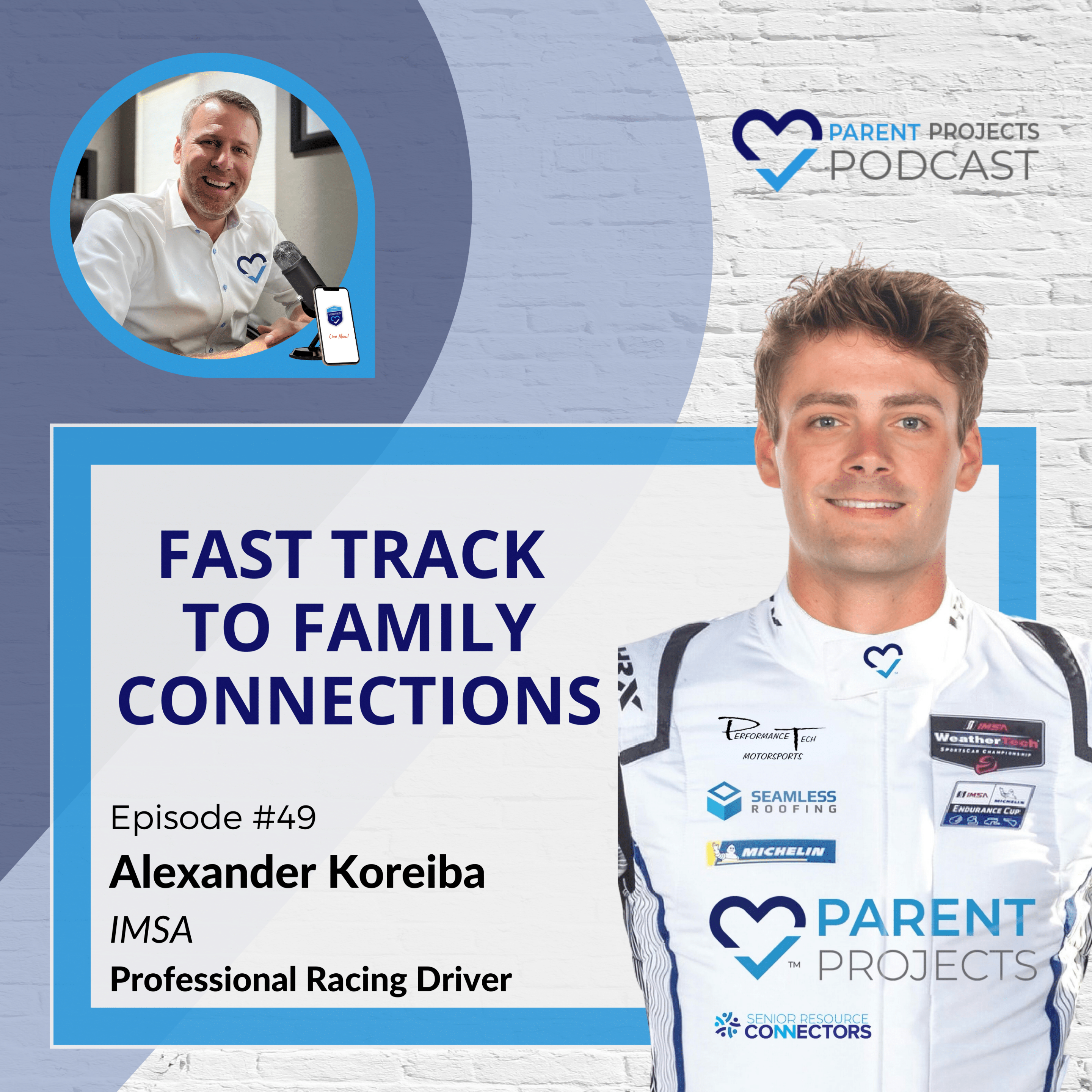[00:00:00] Speaker A: If you don't work in this industry, you're not going to know all these things. And so it's true, you have these extra five minutes, you're kind of on the fence. You want to jump on and see what we have to offer. Yeah, I think that's a great way to start to see, okay, there are these things out there.
Like I mentioned, I want to keep my mom or the patron safe and secure. Where do I even start?
[00:00:22] Speaker B: Right?
[00:00:22] Speaker A: Yeah.
[00:00:23] Speaker B: Right.
[00:00:23] Speaker A: Is that moving them? Is that keeping them in the house? Is that downsizing? It's a lot.
[00:00:31] Speaker C: As our parents grow older, it can be difficult to guide them through their golden years while still respecting their autonomy and fitting it into our already complex lives. Welcome to the Parent Projects podcast, where our guests share practical wisdom to tackle the issues that impact adult children of aging parents. I'm Tony Siebers. Thanks for joining us today.
[00:00:55] Speaker B: Well, hey, everybody. Welcome into this week. I am extremely excited to bring to you Bina Coleman, the director of patron engagement for Parent Projects, a founder of compassionate callers. You've pulled that now in with compassionate concierge on house, and you've joined the team.
[00:01:13] Speaker A: Yes. I'm so excited to be here. Thank you, Tony. Thank you to everybody. It's pretty amazing what we have done together so far.
[00:01:19] Speaker B: It is amazing what we have done together. And I think that's a key piece to first, you and I have gotten an opportunity to talk about our businesses side by side. Now, for some time, you guys may have caught some of the other either episodes here at times where we've interviewed Bina in that organization, or even on businessX radio or other places, and interviews that we've been on and mutually done together, your ability, with your background in gerontology, to understand what's happening at that family level and to stay focused there, allowing me to really rally and work with those businesses. Man, we compliment really well. It's exciting.
[00:01:58] Speaker A: It's very exciting. I think you kind of nailed it on the head right there, that I will be the one who's working with those families, getting them through these crisis with the vendors and the verified businesses that they need, that they don't even know exist, and that we can get them. And then that's where you are doing that. You're getting all these verified, wonderful businesses, resources out there and letting people use them to their benefit.
[00:02:21] Speaker B: Well, when we're able to bring together a community of families that are there, that show that need in one place, it's easier for the businesses to get on board and to commit significant portions of their business to being age friendly. It makes it a lot easier for me to get them to find those ones that are doing that well and bring them to you guys.
Parent projects is still developing. We are continuing to roll out. We're developing what we call publicly. So that means we're out and about. We're in front. We're very transparent about what we can and cannot yet do. We have a lot in the garage, as you might state, that we're excited to build to. But really, you also help us understand that perspective of what a patron's going through, what a family member, whether they be a client or a daughter, a sister, a loved one, a neighbor. Yeah. To step in and do that. Okay, bina, tell us about you, those people that didn't catch you before.
[00:03:17] Speaker A: All right, I'll tell you again.
[00:03:18] Speaker B: Yeah.
How is it that you commit, man, substantial time, talents, and treasures, into serving this in the longevity services marketplace and families? How does that sit on your heart? How'd you come to this?
[00:03:32] Speaker A: Tony's right. I have a degree in gerontology. I love being a gerontologist. I have a passion for this industry, this age of people, I guess you could say. But what always has got me into this is, back in around 1996, I might be off a year or two, my parents brought the first franchises of home and said, senior care, which is a home care agency, to the valley or to Arizona. And at the time, if they were not the first, they were one of the first. There was nothing really like it. I mean, you hired these background check caregivers to come into your loved ones homes. And it was a lot. It was a lot to get used to. Fast forwarded. Now, 2024, I think there's over 500 just in the valley alone of these agencies. So growing up, it's all my brother and I ever heard this client story and that client story. And so when it was time for me to choose a path and what I wanted to do, it's kind of a no brainer for me.
[00:04:28] Speaker B: Well, you think back to 96, there's a lot of things in this age old or old age problem that doesn't change generation to generation, but there's a lot that does. I mean, the two working family, legitimately, across the board, two people out there to make it, and to keep up with inflation and everything else that's going, the pressures of doing that, of raising families, the expectation you and I both have kids, and we chase multiple kids around the valley on top of work in our own lives. We're balancing the same. I have a 23 year old all the way to an eight year old and three others in that total of five, like, peppered in between that and that. Management of all those things meant that there were things I really want to do. I just really don't want to stink at this. It's not something I want to let down. And sometimes I fail to see where I'm going to find the time to listen to my loved one tell me what they want and how they'd like to see it done and then break that down for what that means and what I can do and then figure out, well, who does these things that I don't want to do or I can't do.
You can help with that.
[00:05:42] Speaker A: Yeah. And I think every example you just gave, we're running around with our kids. We're working full time. We have these aging loved ones. This is the true sandwich generation. This is the ones who are going to want these projects to help them say, okay, I know I have this life that I have for my needs. Am I also. I need needs for my aging loved ones. How am I going to make this work? Well, you create this parent project and you get all these resources and tips and you don't have to take it on yourself.
And I think that's a really, or I think that's probably going to be the most helpful. You just feel you're not alone and it's something so wonderful to that feeling that. Okay. It's okay if I didn't call mom five times a day? There are people out there who can do that for me.
[00:06:26] Speaker B: Right? Especially if mom's in a mode or a period of time where mom wants to talk five times a day, you're dealing with. So combating senior isolation. A key goal for parent projects is to engage families so that families are involved at that level and we can combat senior isolation. Senior loneliness, that might come from that. Physical isolation as well. Talk to us about what a compassionate concierge can really do to help with that and bridge that gap for families.
[00:06:59] Speaker A: Yeah, so the compassionate concierge. The idea is that when you set up a project and you speak to your compassionate concierge, you unload what's going on. They really understand. They're going to figure out what these next steps are that you might just not even think of. And that is where it's really going to help with. Okay, maybe mom needs to see, or, excuse me, be in a support group. Maybe mom needs to go to the local senior center once a week. I mean, it could be as simple as that, or it could be, let's get a caregiver in there for companionship. If we're touching on the isolation part, right. There's so many different resources, so many higher end, lower end. It's all over the board. And it can make somebody's life so much better to have that companionship, to have that interaction, to get them to feel like they matter again and they're not stuck in the house all day.
[00:07:48] Speaker B: Well, one other important bridge that we really needed in building these tools was understanding where people don't fit the mold. Like we get into maybe a small community or a rural community, that maybe it doesn't have the same kinds of resources. And you want somebody who's trained to be able to hear that, understand what that need is, so that we can start recruiting for somebody to go fill that gap. As we see all of that going, what are some of the things when a concierge gets on the phone with a family, with a loved one, right. Or with me, I'm going to call and dealing with my parent project. What are some of the first questions that the concierge is going to talk with me about as I'm just trying to get my bearings the first time.
[00:08:36] Speaker A: And I think that's a very fair question. And I think right away your concierge is going to say, what would you like to see? You're very stressed. There's a lot going on right now. What is it that we want? Your loved one in a safe and secure place. We got that. But would you like her being more social?
Is she depressed? Does she need a mobile doctor? There's a lot that goes into it. So that is our number one. We want to figure that out. And from that question alone, I feel like we can deep dive into so many others, such as I kind of touched on it just now. But are they too world to get to the doctor as often as they need, or do they even want to drive at that time? We can talk about a mobile doctor. There's just so many different solutions that that one question can open up.
[00:09:20] Speaker B: Well, and I like that you're taking from me the perspective of where I want to see it go, essentially, for me to tell you what done looks like. Yeah, at the moment, and maybe that changes, like six months from now or two months from now. But for the moment, for what I'm in, I don't have to know everything. I just have to be able to tell you. You're going to ask me what's the problem. What's keeping me from moving there today? Okay. And then we'll solve that first problem and move through that, move it together.
[00:09:47] Speaker A: And again, you touched on it. Everything's going to change. Right? It's just one of those life things and we're just going to work with it, with what we have, and we're going to keep it on because we're not going to quit. We want the absolute success that you see at the end for your loved ones.
[00:10:05] Speaker B: That sounds fantastic. Now, along the way, like you said, things do change. The industries, what the needs are, over 70 industries, service or categories of businesses that might fill in and do this. I can get lost sometimes even online, just knowing where to start and just knowing that somebody can give me what to do with my next five minutes. And there may be a time where I'm not worried, I'm not ready to jump into a platform and instead of maybe even jump into the parent projects platform where we're trying to coordinate our loved ones, I'm just trying to get my first five minutes bearings.
[00:10:46] Speaker A: Yep. It really is to the point where if you don't work in this industry, you're not going to know all these things. And so it's true, you have these extra five minutes, you're kind of on the fence. You want to jump on and see what we have to offer. Yeah, I think that's a great way to start to see, okay, there are these things out there.
Like I mentioned, I want to keep my mom or the patron safe and secure. Where do I even start?
[00:11:13] Speaker B: Right?
[00:11:13] Speaker A: Yeah.
[00:11:13] Speaker B: Right.
[00:11:14] Speaker A: Is that moving them? Is that keeping them in the house? Is that downsizing? It's a lot.
[00:11:17] Speaker B: Well, and it is literally drinking from a fire hose when you get into, there's some great information online, but it's difficult also to know what's real in this world of AI, generating content and throwing stuff out. Sometimes I'm not sure what's legit and what's not, but the information that you're working with comes from industry experience and actually dealing with and pulling that information from actual businesses working and helping families in our system.
[00:11:45] Speaker A: And I think that's the coolest part, truthfully is this verify business is I'm not going to just send a family to any agency. Like you said, I need to make sure we have vetted them. The parent projects way. They have that love check, they do all the correct background checks and all that on their employees. And so we can really say, hey, guys, we got this really good resource for you. And you don't need to search anymore.
[00:12:11] Speaker B: I can see that bringing a lot of comfort. Tell us now, when somebody's going to do, what should they be able to expect out of what's a cost for this? If I need to reach out and have a concierge help me get my bearings, maybe I only need 1015 minutes of your time. Maybe I need 30 minutes of your time. I don't even know what I need.
How would I expect that to go down? What's the user experience generally going to be? I'm going to go online, I'm going to go to parentprojects.com or I'm inside my parentprojects.com, I'm in your port projects connect my platform.
I'm going to hit that button and I know it gives me a schedule. What am I scheduling? And am I paying something right there? What's that look like?
[00:12:54] Speaker A: Okay, so good question. So when you are scheduling, you will be scheduling with a compassionate concierge, a real person? A real person, not a bot, not a bot, not an AI, real me, somebody on my team, it will be a real person. And that's to me, and I know you agree, very important. This is a very sensitive time. It can be a very trying time. You need that personal and human touch. So that's what you will be setting up is a phone call and it's virtual, so you decide how you want to do it, virtually. Like you said, you don't know how much time. Maybe it's only going to be a 15 minutes, maybe it'll be an hour call. You really don't know. But you sign that up, you wait till the time of the call. You have your call, you get your information, you get your resources, and then the call's over. Well, yes, there is going to be a little bit of tipping service. Actually. It's kind of clever. It's a concierge as we are. It's like any concierge, we want to give you the Ritz Carlton experience. And so if there's a concierge there helping, it's kind of the same thing. You don't have to. You can if you felt like it was good, but we just kind of want you to know that that option is there for you to do tipping at the end. And you can give what you can give. You never have to feel pressure. Does not matter what you give. You will still be getting that Ritz Carlton experience, the resources, the verified businesses.
[00:14:22] Speaker B: The reasons that I might not be able. Maybe I'm cash strapped at a particular time or just mean. I like that. It could be a familiar type of thing. More like that. Yeah. Concierge. I know what that looks like. I have a concierge. I need help doing this thing. I don't know the best way to go grab tickets to this thing or to go in here. I'm not a guy that keeps up on that, but they do. And then I tip out an appropriate amount. That makes sense for me against that. That's a great soft approach.
[00:14:49] Speaker A: Yeah. It's very good for concierge. I like it, too.
[00:14:53] Speaker B: So where I also looking at this from that higher level parent projects. It fits in with the importance of being able to serve everyone in all families, regardless of where they're at or in that moment that they're at at that time. If you need the help, get the help. Get the help. Okay, great.
[00:15:09] Speaker A: Yeah.
[00:15:10] Speaker B: Tell me anything that I should, in particular I should have ready or at the hand when I make a phone call?
[00:15:18] Speaker A: Yes. I would think that when you are at the point you are ready to make this concierge call, just feel comfortable enough with this person to let them know what's really going on. You don't want to hold back. You really want to talk to your concierge and let them know, because that's the only way you're going to get those best verified resources. The concierge will give you after the first question, an assessment.
Of course, you don't have to answer the questions, but it's all going to help in the long run. The more information that you are willing to share, the better the resources can be.
[00:15:52] Speaker B: And you don't sell my information or even give my information out to these businesses.
You just give me what I need to connect to them. So I still stay in charge of my project?
[00:16:02] Speaker A: Absolutely. Anything we give you, you don't have to use. No one's going to be contacting you from them. This is really just. Hey, listen, I've heard what's going on. I want to help. I want to take this off your plate. This is who I would recommend.
[00:16:15] Speaker B: That is fantastic. It takes a lot of pressure. Yeah. Okay. And I don't have to worry that my loved one's information or any of that is being locked up someplace or then shotgun blasted out across to anybody who pays for that lease. No, that's just not it.
[00:16:30] Speaker A: That's just not it. And I feel like for anyone who's going to make a project, if it were you and me, we wouldn't want that. Exactly right.
[00:16:38] Speaker B: I have a parent project that I use parent projects, working in our own parent projects, so that makes a lot of sense. What else should we be thinking about? Anything or just kind of parting as we go to wrap this up?
[00:16:50] Speaker A: Yeah, I think we kind of touched on the compassionate concierge. I think if you even think something is happening with your love, aging loved one or you just kind of want to know what the next steps are, there's no harm in making that first connection and making that call, setting up that call. Excuse me, because I think it's really important that if you've never thought about this, to even have, like, a little inkling of an idea of, okay, it might happen one day. It will happen one day. What do I do?
[00:17:21] Speaker B: Okay, great. Well, you did an awesome job, and I'm confident what you're going to bring is going to just absolutely fill the hearts of the last lost and Lisa sits out there and everyone else at the paramount.
[00:17:31] Speaker A: Thank you.
[00:17:32] Speaker B: Tony, thank you for being on board, and thank you for joining us this week. If you did have any questions, comments or concerns from this, feel free to leave some feedback down below. As always, you can visit
[email protected] you can also find us at parent projects on pretty much any social media site you could possibly think of in your favorite social streams. Until you and I get that opportunity to sit down and have this conversation again. Behold and beheld.
[00:18:06] Speaker C: Well, that's it for the team this week, and thanks for joining us. If you've enjoyed the content, remember to subscribe and to share this episode on the app that you're using right now. Your reviews and your comments, they really help us expand our reach as well as our perspective. So if you have time, also drop us a note. Let us know how we're doing for tips and tools to clarify your parent project, simplify communication with your stakeholders, and verify the professionals that you choose. You can find us on YouTube, follow us on Instagram and Facebook. Thanks again for trusting us until our next episode. Behold and be held.
[00:18:38] Speaker D: Thank you for listening to this parent projects podcast production. To access our show notes, resources or forums, join us on your favorite social media platform or go to parentprojects.com.
This show is for informational and educational purposes only.
Before making any decisions, consult a professional credentialed in your local area.
This show is copyrighted by Family Media and Technology Group, Inc.
And Parent Projects, LLC.
Written permissions must be granted before syndication or rebroadcast.
